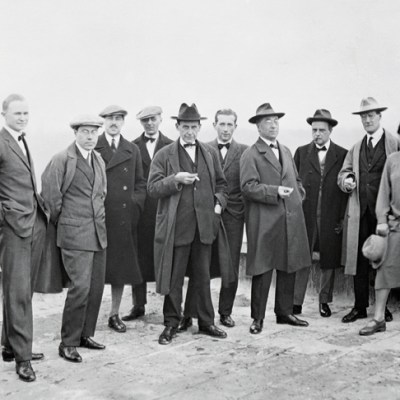For as long as I can remember, Tom Lehrer has represented everything that is good about the 20th century. Not that I would have put it like that until today, now that the musical satirist and mathematician – what a dry description, but it’s the one the obituaries are going with – has died at the age of 97.
Perhaps everything that is good about the mid 20th century, to be more accurate. The live albums An Evening Wasted with Tom Lehrer (1959) and That Was the Year That Was (1965) were a cultural education, full of names, places, puns and rhymes that I have been catching on to ever since I first heard the records as a child of the 1980s surrounded by the influences of the late 1950s.
The range of reference was part of the attraction – Oedipus Rex, Wernher von Braun, Alma (and ‘Gustav and Walter and Franz’), the periodic table, Harvard football and Hubert Humphrey. What would it mean, I wondered, to know what was going on? However, even if you don’t, Lehrer’s songs are generous, not exclusionary; they draw the listener in, never shaming you for not getting it, whatever ‘it’ is. (In a literal act of generosity, in 2022 Lehrer released all his work into the public domain – ‘So help yourselves, and don’t send me any money,’ he signed off on the website where you can still download all his music and lyrics.)
It’s not just that the music is full of jokes: Lehrer’s reworking of ‘Clementine’ (‘a song with no recognisable merit whatsoever,’ he deadpans) – in the style of first Cole Porter, then Mozart, bebop and, finally, Gilbert and Sullivan – brilliantly shows off his gift for pastiche. Some of the rhymes are pure genius. ‘Poisoning Pigeons in the Park’ might seem more psychopathic than it does, were it not for a couplet like ‘My pulse will be quickenin’ / With each drop of strych’nine’ where an extra syllable is dropped right into the middle of the toxic alkaloid. When Lehrer has to wrap up his exhilarating list of periodic-table elements to the tune of ‘I am the very model of a modern Major-General’ , you don’t have to be familiar with the non-rhotic Boston accent to find the outrageously stretched vowels funny: ‘These are the only ones of which the news has come to Ha’vard / and there may be many others, but they haven’t been discavard.’
The live recordings are a masterclass in how to keep a performance moving – I can’t imagine most of these songs without the patter. One of the more revealing introductions is that to ‘Lobachevsky’, in which Lehrer reminds us that ‘Before I went off, not too long ago, to fight in the trenches, I was a mathematician by profession. I don’t like people to get the idea that I had to do this for a living. I mean, it isn’t as if I had to do this, you know. I could be making $3,000 dollars a year – just teaching.’
Lehrer spent his National Service with the NSA and in 1959 the exaggeratedly low figure of $3,000 was closer to the salary of an office boy. However, it was true that he wasn’t writing songs or performing for the money. And, perhaps, as mathematicians expect to do their most important work when young, he felt the same about music. When asked about it later, he said that the songs began to come less easily. He stopped performing regularly in 1960, before coming back with new material for an American version of ‘That Was the Week That Was’ in 1964 and ’65. These songs make fun of a more dangerous Cold War world, ‘What with President Johnson practising escalatio / on the Vietnamese’ (‘Send the Marines’), nuclear proliferation (‘Who’s Next?’) and the prospect of nuclear annihilation (‘We Will All Go Together When We Go’)
If these songs represent the best of their time, the meeting of high culture and low to create erudite mass entertainment, their subject matter – imminent mass destruction – represents its worst fears. If I feel the urge to twirl in 4/4 time when I hear the name ‘Wernher von Braun’, it’s because of Lehrer’s mocking song, and not exactly appropriate. But perhaps no less appropriate than the inventor of the V-2 rocket, built by slave labour, developing the launch-vehicle that would take Apollo 11 to the moon. Lehrer famously said in 1973 that ‘Political satire became obsolete when Henry Kissinger was awarded the Nobel Peace Prize.’ Like many others, it was my first thought when Kissinger died in 2023; my second was how satisfying it was that Lehrer had outlived him. When Tom Lehrer died, I thought only of how much his very silly and very brilliant songs have meant to me – and of how they have outlived the moment of their creation and now their creator.
The music and lyrics of Tom Lehrer are available on https://tomlehrersongs.com.



